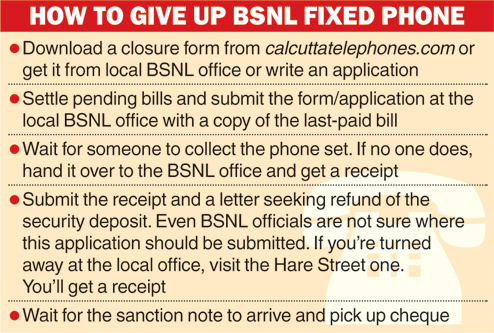
Three decades ago getting a landline telephone connection in Calcutta would take years. In 2016, it takes days. But surrendering a connection and getting back the security deposit can drag on for half a year. Ask Bikash Mukherjee.
The 67-year-old Hindusthan Park resident had volunteered to help his Delhi-based relative Raja Dasgupta surrender the landline in his name at his Tiljala home.
"I thought it would take a week or two. Since it was not possible for Raja to come to Calcutta frequently, I offered to do the formalities on his behalf," recounted Mukherjee.
This was in March. On September 6, 174 days later, Mukherjee received a call from BSNL informing him that a cheque refunding the security deposit of Rs 2,280 Dasgupta had made while getting the landline was ready.
By then, Mukherjee had lost count of the number of times he had visited BSNL offices. He had spent as much time disconnecting a phone as it takes some communication satellites to orbit the Earth 2,800 times.
Mukherjee's experience is not unique. More and more Calcuttans are giving up landlines and many are being forced to jump through hoops to cut the telephone cord.
The city wing of BSNL receives about 8,000 applications every month surrendering landlines, said A.K. Ghorai, deputy general manager, marketing and sales, Calcutta Telephones. The number of landline subscribers had declined from about 15 lakh in 2005 to 6.4 lakh in August 2016, mainly because of the mobile phone boom, migration of the working population from the city and service issues. A bulk of those who have retained their landlines have done so to keep their BSNL broadband connection.
Going by Mukherjee's experience, if the company seems to be trying to retain customers, not by improving service, but by making it very difficult to leave.
Mukherjee recounted the refrain he heard at the multiple Calcutta Telephone offices he visited in the city over seven months: " Etai amader niyom (this is our rule)."
"I have dealt with my share of government officials. The attitude of the BSNL staff is like that of government officials 20 years ago," Mukherjee, who retired as the general manager of a mining equipment manufacturing company, told Metro.
In 2016, the Calcutta Telephones website still does not say how to surrender a landline. So on March 15, Mukherjee went to the BSNL office at Ballygunge Place, only to be told that Dasgupta's connection is under the jurisdiction of the CR Avenue office. When he went there the next day, he was told that the closure form was not available. Application to surrender landlines is received only on Tuesday, Thursday and Saturday, an official told him.
Mukherjee managed to download the closure form from the Internet and got it signed by Dasgupta.
On April 23, he submitted the form at the CR Avenue office and was given a receipt. He was told that an official from BSNL's Hungerford Street office would visit the Dasgupta home within seven days to pick up the telephone set and give a receipt.
When no one turned up at the Tiljala house, Mukherjee on May 4 visited the Hungerford Street office with the telephone set and deposited it there. He was given a receipt and told to submit it at the BSNL office on Hare Street to collect the refund.
Mukherjee got an authorisation letter and a letter seeking the refund signed by Dasgupta and visited the Hare Street office the next day. After submitting the letter and receipt, he was told that a sanction note would be issued from the office. He would have to collect the note from Hare Street and submit it at the CR Avenue office from where the refund cheque would be issued soon.
More than three months passed but the cheque did not arrive. On July 20, Mukherjee visited the Hare Street office again and submitted a reminder letter signed by Dasgupta. All he got against the letter was another receipt.
Determined to see the matter through, Mukherjee turned to the BSNL website - which says the refund of security deposit would be processed "within 60 days of date of closure" - for a solution. He submitted an e-complaint on BSNL's online grievance cell. Another fortnight passed before he received the call informing him that the cheque was ready. Mukherjee collected it from the Hungerford Street office the next day. "It was not about the money. I was determined to see the end of it," said Mukherjee.
Asked about Mukherjee's experience, Ghorai said he could not comment on individual cases but added that a "system upgrade" might have led to the delay. He said things were back to normal now.











